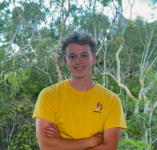

Peter Lowley
peterlelkes.lowley@my.jcu.edu.au
Masters by Coursework
College of Science and Engineering

Peter Lowley
peterlelkes.lowley@my.jcu.edu.au
Masters by Coursework
College of Science and Engineering
Assessing Macroalgal Removal: Impacts on Ecosystem Functioning and Algal Community Assemblages
Peter is a current student of James Cook University, where he is completing his Masters of Marine Biology by Research. Originally from Scotland, he completed his undergraduate at St. Andrews University where he studied a joint-honours in Biology and Economics. He explored where the fields intersected, including spending time working with Marine Scotland as an Economic Researcher focusing on climate change projects, and as a research intern with his schools economic department. However, he made the decision to undertake his studies at JCU, to follow his passion for coral reefs. Outside of his studies, he is a keen Scuba Diver and underwater filmmaker, and enjoys being outdoors whether its camping, hiking or running.
Assessing Macroalgal Removal: Impacts on Ecosystem Functioning and Algal Community Assemblages
2024 to 2025
Project Description
Macroalgal removal has shown to be a promising method to restore coral cover on reefs that have been degraded by macroalgal proliferation, such as inshore reefs on the GBR. This project aims to assess the effectiveness of this restoration tool from two key aspects. Firstly, to determine if macroalgal removal effectively restores the ecosystem functioning of degraded reefs through analysis of functional traits and quantifying ecosystems functions (reef accretion, habitat provisioning, recovery rate). Secondly, the project will assess changes in macroalgal community composition between control and experimental plots to determine changes in species diversity following macroalgal removal.
Project Importance
Coral reefs are currently facing a multitude of threats, and proliferation of macroalgae is a key threat to many inshore reefs which can prevent and diminish coral recovery following disturbances. Macroalgal removal provides a promising method to restore reefs suffering from this overgrowth and return reefs to a state of coral dominance. Evaluating whether sea-weeding can restore functional traits is essential to understanding whether ecosystem functions can return, or whether other methods may need to be deployed (e.g. coral out-planting, larval seeding, etc.) to restore ecosystem functions, particularly following recent studies showing deficits in functional traits in naturally recovered reefs. Secondly, assessing changes in macroalgal communities will provide an indication to the successional changes expected following the removal of dominant species.
Project Methods
The project uses historical benthic data (PITs, photoquadrats) collected from Arthur Bay and Florence Bay on Magnetic Island, Queensland. Historical data (2018-2024) will be supplemented with data collected in situ during 2025. The data includes benthic cover, with biotic community members identified to genus level. Functional trait values for each genus of coral will be obtained from the coral Trait database (Madin et al, 2016). A trait space will be generated, and ecosystem functions quantified (Carbonate Accretion, Primary Productivity, Habitat Complexity, Mechanical Stress Resilience and Recovery). For macroalgal assessment, a novel trait database will be constructed through a literature review.
Project Results
The project will develop a functional trait space for experimental removal and control plots to determine if removal of seaweeds alters the diversity of functional traits on the reef, and if functions in the “restored” areas are indicative of greater ecosystem health.
Keywords
Algae,
Biostatistics,
Coral reefs,
Corals,
Distribution,
Ecology,
Economic development,
Field based,
Interaction,
Intertidal,
Manipulative experiments,
Mapping,
Marine planning,
Modelling,
Monitoring,
Qualitative techniques,
Quantitative marine science,
Remote Sensing,
Social interactions,
Temporal change,
Tourism